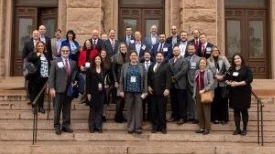New Additional Pathway Rules Adopted by State Board
By Kenneth Besserman, JD, LLM
Director of Government Affairs & Special Counsel
On Sept. 18, 2025, the Texas State Board of Public Accountancy (TSBPA) adopted rules addressing the new additional pathway to licensure that passed during the 89th Legislative Session. Senate Bill 262, passed unanimously by the Texas Legislature, allows students to obtain their CPA license with the completion of a bachelor’s degree with the required accounting concentration, two years of work experience and passage of the uniform CPA exam.
Senate Bill 262 was one of the first additional pathways passed in 2025, leading a national effort to address the CPA pipeline. To date, more than 25 states have passed pathways legislation, with many more in the process of passing or intending to introduce legislation soon. The speed at which states have adopted this additional pathway has been one of the most significant changes to CPA licensure in decades.
As Texas became one of the first to pass legislation, it also has become one of the first to adopt rules addressing the accounting hours needed to complete the new additional pathway. Rules adopted by TSBPA will become effective Oct. 10, 2025. The additional pathway to licensure begins Aug. 1, 2026. Rules addressing the legislation were discussed and debated over the last several months in an attempt to provide time for universities to adapt to the new pathway.
TXCPA vigorously advocated during the legislative session and the rulemaking process for a different approach to the new pathways legislation that acknowledges the new pathway is intended to be a different educational experience than the traditional 150-hour pathway to licensure. TXCPA will continue to push for additional changes to the rules that more closely align with the legislative intent of the new pathway legislation.
TXCPA also successfully advocated for the inclusion of language allowing students to transition from the 150-hour pathway to the new bachelor’s pathway if they choose. TSBPA included rules permitting current 150-hour candidates to take advantage of the new pathway.
The new pathway rules include some significant changes from the 150-hour pathway to licensure. Rule changes were adopted both for the 150-hour pathway and the new bachelor’s pathway. While rules for both pathways take effect Oct. 9, candidates cannot become licensed under the new pathway until Aug. 1, 2026. Click here for a chart highlighting some of the more significant rule changes.
TXPCA is working closely with the state board, educators and candidates to better understand the new rules, their impact and how the rules will interact with other states' educational pathways to licensure. Reach out to TXCPA for more guidance on the rules, how candidates can transition from the 150-hour pathway to the bachelor's pathway, and any other matter relating to CPA licensure.


